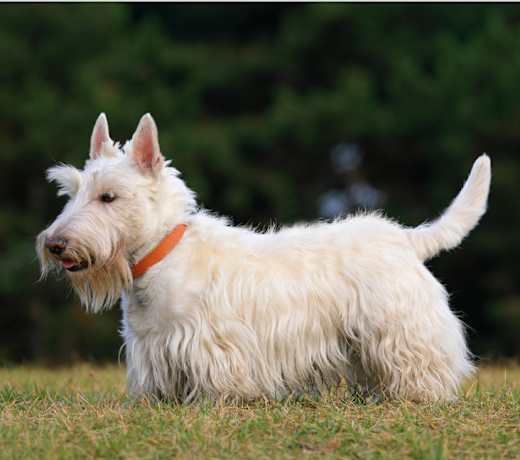No, Westies are known for their signature white coats. They do not come in different colors; but, they can have slight variations in shade, ranging from pure white to a creamy color.
West Highland Terrier
Breed Type: Terrier
Common nicknames: Westie
Coat: Double
Hypoallergenic: Yes, they may not trigger allergies.
Temperament: Lively, affectionate, playful, confident
Life expectancy: 11-15 years
Color & patterns: White

A favorite among dog lovers around the world, the West Highland White Terrier, aka the “Westie,” is a spunky breed full of personality and charm. Westies stand about 10 to 12 inches tall and weigh around 11 to 23 pounds, making them the perfect size for apartment living or snuggling up on the couch with their favorite human. Westies’ hunting instincts are still alive and well, and they love nothing more than chasing after squirrels and other critters in the backyard. With proper training and socialization, your Westie can be a well-behaved and lovable companion both in and out of the home.
West Highland Terrier characteristics
Learn about about West Highland Terrier basics like their fur colors, shedding levels, how much grooming they need, and other West Highland Terrier facts.
Average height
10-12 inches (25.4-30.5cm)
Average weight
11-23 pounds (5.0-10.4 kg)
Average lifespan
11-15 years
Exercise needs
Grooming needs
Full-grown size
Good with cats
Good with kids
Training aptitude
Do Westies have a double coat?
Yes, Westies have a double coat. They have a soft undercoat for insulation and an outer coat that helps repel dirt and moisture. This double coat helps them stay warm in cold weather and protects their skin while working outdoors. Regular grooming is essential to keep their coat healthy and free from tangles.
Do Westies shed?
Yes, Westies shed, but they are considered low-shedding dogs. Their coat requires regular grooming to remove loose hair and prevent matting, especially because their shedding is not as noticeable as some other breeds.
How big do Westies get?
Westies usually weigh between 15 to 20 pounds and stand around 10 to 11 inches tall at the shoulder. They are a small to medium-sized breed, sturdy and compact in build.
How long do Westies live?
On average, Westies have a lifespan of around 13 to 15 years. Individual lifespans can vary based on factors such as genetics, diet, exercise, and overall healthcare.
What age are Westies full-grown?
Westies typically reach their full-grown weight between 12 to 18 months of age. They tend to reach their full height by nine months old. Their growth can come in spurts, so don’t be surprised if they seem to grow a lot one month and then not much the next.
West Highland Terrier temperament
Learn about about the West Highland Terrier temperament and how well they fit into your lifestyle, home environment, and family.
Are Westies good dogs?
Yes, Westies are good dogs with lively and affectionate personalities. They are typically loyal, playful, and confident dogs, often forming strong bonds with their pet parents and making them great companions for many households.
Are Westies good with kids?
Yes, Westies can be good with kids, especially if they are raised together and both the dog and the children are taught how to interact respectfully. However, as with any breed, supervision is always recommended when dogs are around young children to prevent accidental rough play or misunderstandings.
Are Westies easy to train?
Yes, Westies are intelligent and eager to please, which can make them easy to train. However, training any dog takes substantial time and effort, regardless of breed, and Westies may have a stubborn streak, so patience and persistence are key when training them. Consistent and positive reinforcement methods work well with this breed.
Are Westies good with cats?
Yes, Westies can be good with cats, but proper introductions and supervision are essential when introducing them, as some Westies may have a strong prey drive and may not be suitable for households with small animals. However, with early socialization and training, many Westies can live harmoniously with cats.
Are Westies good with other dogs?
Yes, Westies can get along well with other dogs, especially if they are properly socialized from a young age. Like any breed, individual personalities vary, so some Westies may be more social or tolerant of other dogs than others. Early socialization and positive experiences with other dogs can help promote good behavior and compatibility with canine companions.
Are Westies smart?
Yes, Westies are known for being smart. They are quick learners and often excel in activities such as obedience training, agility, and even some canine sports. Their intelligence, combined with their spirited nature, can sometimes lead to them finding creative ways to get what they want.
Are Westies friendly?
Yes, Westies are friendly and outgoing dogs, but like any breed, individual temperament can vary. Proper socialization and early exposure to various people, animals, and environments can help ensure that they develop into well-rounded and friendly companions. With their affectionate nature, Westies often enjoy spending time with their family members and may eagerly greet visitors to their home.
Are Westies stubborn?
Yes, Westies can exhibit stubborn tendencies, which can sometimes pose a challenge during training sessions. However, they can learn to follow commands and behave appropriately with patient and consistent training methods.
Do Westies like to swim?
Yes, some Westies enjoy swimming, but others may not be as enthusiastic about it. Introducing them to water gradually and providing positive experiences can help determine their level of interest in swimming. Always supervise them around water to ensure their safety, as not all Westies are strong swimmers.
Are Westies affectionate?
Yes, Westies are known for their affectionate nature. They often form strong bonds with their pet parents and enjoy spending quality time with them. They may seek out cuddles, lap time, and physical affection, making them wonderful companions for those who enjoy close interaction with their pets.
Are Westies good apartment dogs?
Yes, Westies can adapt well to apartment living, provided they receive enough exercise, mental stimulation, and attention from their pet parents. Their small size makes them suitable for apartment living, but they still need regular walks and playtime to maintain their physical and mental well-being.
Are Westies high energy?
No, Westies have moderate energy levels. While they enjoy playtime and outdoor activities, they are not high-energy dogs. Daily walks and some interactive playtime are usually sufficient to keep them happy and healthy.
Do Westies bark a lot?
Yes, Westies have a tendency to bark, as they are alert and vocal by nature. Early training and socialization can help manage their barking tendencies, but they may still vocalize to alert their pet parent of any perceived threats, such as a squirrel scampering in the yard.
West Highland Terrier history
Learn about where the West Highland Terrier came from.
What were Westies bred for?
West Highland White Terriers, or Westies, were originally bred for hunting small game, such as rats and foxes. Their keen sense of smell and tenacious spirit made them well-suited for this task.
Where are Westies from?
Westies, officially known as West Highland White Terriers, hail from the western regions of Scotland, particularly from the Poltalloch estate in Argyll. The breed has existed for over 3000 years.
West Highland Terrier health
Learn about about the West Highland Terrier health outlook and what diseases they may be prone to at various stages of their life.
Do Westies have health problems?
Like all breeds, Westies are prone to certain health issues. Some common health problems that can affect Westies include:
Hip and/or elbow dysplasia: Hip and elbow dysplasia are two of the most common skeletal diseases seen in dogs. They are similar diseases in which either the hip or elbow joint has grown abnormally or is misshapen. The abnormal shape prevents the joints and sockets from properly meeting one another, resulting in rubbing and grinding instead of sliding smoothly. Over time, the rubbing from dysplasia can cause a variety of issues such as pain, lameness and secondary osteoarthritis. Surgery can be done to fix the joint if diagnosed before the onset of arthritis.
Legg-Calve-Perthes: This is a condition that causes the head of the femur (located in a dog’s hind leg) to spontaneously degenerate. Over time, this will lead to erosion of the hip joint and arthritis. A Westie suffering from Legg-Calve-Perthes will become lame, limp while walking, and experience pain when moving the hip joint. Surgery is the most effective treatment for the disorder.
Idiopathic pulmonary fibrosis: Also known as “Westie lung disease,” this disease is chronic and progressive to the lungs and their connective tissue. This makes the lungs become thickened and stiff, preventing oxygen from passing normally into the blood. The condition can be triggered by chronic injury to the respiratory system from conditions such as pneumonia, congestive heart failure, and chronic bronchitis, but in some cases, there is no known cause. There does appear to be a genetic component to the disease. Symptoms vary from dog to dog but include decreased appetite, loss of stamina, rapid breathing, a cough, and shortness of breath. Veterinarians will also notice a loud “crackling” in the lungs during routine exams. There is no cure for pulmonary fibrosis, and the condition is progressive.
Portosystemic liver shunt: Portosystemic shunt (PSS) is a hereditary issue that obstructs proper blood flow to the liver. Since the liver is responsible for detoxifying the body, PSS sends the toxins in unfiltered blood to the heart, brain, and other body parts. Signs can include (but are not limited to) behavioral changes, loss of appetite, hypoglycemia (low blood sugar), jaundice, urinary tract problems, vision problems, and stunted growth. PSS can be life-threatening if not treated early. Antibiotics and diet changes can help in the short term, but surgery is the only permanent treatment for the problem.
Craniomandibular osteopathy: Sometimes referred to as “Westie jaw,” this abnormal growth of the jaw can make it difficult to swallow or chew food. The cause is unknown, but it is believed to be hereditary. Though it is quite painful and can cause feeding issues, most puppies grow out of it once they reach adulthood.
Patellar luxation: Also known as slipped kneecaps, patellar luxation is a common problem in many dog breeds. It occurs when slight abnormalities cause the knee joint to slide in and out of place. This can cause pain and occasional lameness. Surgical treatment is available for severe cases, although many dogs lead normal lives without treatment.
Idiopathic tremor syndrome: Also known as “white dog shaker syndrome,” this genetic condition causes tremors lasting days, weeks, or for the rest of their lives.
Are Westies hypoallergenic?
Yes, Westies are considered hypoallergenic. While no dog breed is completely hypoallergenic, Westies are considered to be relatively hypoallergenic compared to some other breeds because they have a minimal shedding coat and produce less dander, which may be less likely to trigger allergies in some individuals. However, it’s essential to spend time with a Westie to see if you have any allergic reactions before bringing one into your home.
What do Westies usually die from?
Like all dogs, Westies can succumb to various age-related illnesses or conditions, such as cancer, heart disease, or organ failure. Additionally, accidents or injuries can also contribute to their passing. Regular veterinary care, a balanced diet, exercise, and a loving environment can help prolong their life expectancy and overall well-being.
Popular West Highland Terrier mixes
Breeds that are commonly mixed with Westies include Miniature Schnauzers, Pomeranians, and Bichon Frises. Characteristics of a Westiemix can vary widely depending on the specific breeds involved, the individual dog’s genetics, and its upbringing. A few common Westie mixes include:
Wauzer (Westie + Miniature Schnauzer)
Weeranian (Westie + Pomeranian)
Wee-Chon (Westie + Bichon Frise)
Weshi (Westie + Shih Tzu)

Find West Highland Terrier puppies near you
Adopting a West Highland Terrier
Learn about acquiring a West Highland Terrier - the pros and cons of adopting versus going through a breeder, and associated costs.

Kaylee
Westie, West Highland White Terrier Maltese
Female, 10 yrs 2 mos
Santa Monica, CA
Good with cats
House-trained
Spayed or Neutered
Shots are up-to-date

Toto
Westie, West Highland White Terrier Maltese
Male, 8 yrs
Santa Monica, CA
Good with dogs
Good with cats
Spayed or Neutered
Shots are up-to-date

Luna
Westie, West Highland White Terrier Dachshund
Female, young
Los Angeles, CA
Spayed or Neutered
Shots are up-to-date

Miko
Westie, West Highland White Terrier Schnauzer (Miniature)
Male, 2 yrs 9 mos
Shadow Hills, CA
Good with dogs
Not good with cats
Needs experienced adopter
House-trained
Spayed or Neutered
Shots are up-to-date

Luck
Westie, West Highland White Terrier
Male, 4 yrs 3 mos
Canoga Park, CA
Spayed or Neutered
Shots are up-to-date

Peewee
Westie, West Highland White Terrier
Male, 3 yrs 1 mo
Woodland Hills, CA
Good with dogs
House-trained
Shots are up-to-date

Rubie
Westie, West Highland White Terrier Poodle (Miniature)
Female, 9 yrs 7 mos
Woodland Hills, CA
Spayed or Neutered
Shots are up-to-date

Milo
Westie, West Highland White Terrier Terrier (Unknown Type, Small)
Male, 4 yrs 8 mos
Torrance, CA
House-trained
Spayed or Neutered
Shots are up-to-date

Kaylee
Westie, West Highland White Terrier Maltese
Female, 10 yrs 2 mos
Santa Monica, CA
Good with cats
House-trained
Spayed or Neutered
Shots are up-to-date

Toto
Westie, West Highland White Terrier Maltese
Male, 8 yrs
Santa Monica, CA
Good with dogs
Good with cats
Spayed or Neutered
Shots are up-to-date

Luna
Westie, West Highland White Terrier Dachshund
Female, young
Los Angeles, CA
Spayed or Neutered
Shots are up-to-date

Miko
Westie, West Highland White Terrier Schnauzer (Miniature)
Male, 2 yrs 9 mos
Shadow Hills, CA
Good with dogs
Not good with cats
Needs experienced adopter
House-trained
Spayed or Neutered
Shots are up-to-date

Luck
Westie, West Highland White Terrier
Male, 4 yrs 3 mos
Canoga Park, CA
Spayed or Neutered
Shots are up-to-date

Peewee
Westie, West Highland White Terrier
Male, 3 yrs 1 mo
Woodland Hills, CA
Good with dogs
House-trained
Shots are up-to-date



